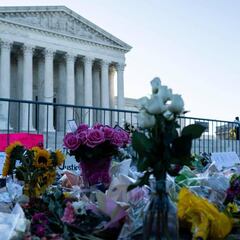Amy Coney Barrett Supreme Court confirmation: who is she?
With a Senate majority expected to confirm Barrett as Justice in record time; another Republican-backed lifetime post would be a landmark legacy for Trump.

This morning in Washington the Supreme Court began its confirmation hearings of the newly nominated justice Amy Coney Barrett. The hearings are scheduled to last four days.
What will happen in the confirmation hearing?
Today, Monday October 12, each of the 22 members of the Judiciary Committee will present a 10 minute opening statement. Later today an opening statement will be given by Barrett herself. Then witnesses, both supporting and opposing the nomination will present their views. Senators question the nominee her qualifications, judgment, and philosophy.
Sen. Richard Blumenthal (D-Conn.) tells Amy Coney Barrett he will oppose her nomination: "Your nomination is about the Republican goal of repealing the Affordable Care Act, the Obamacare they seem to detest so much" https://t.co/uScvfX9o80 pic.twitter.com/NJyM1aeakF
— CBS News (@CBSNews) October 12, 2020
Republicans have a majority of two on the Committee and it is widely assumed that all Republicans will vote to confirm Barrett while all Democrats will oppose. Republicans need a majority of 51 to confirm the nominee.
Who is Amy Coney Barrett?
48-year-old mother of seven Amy Coney Barrett currently serves as a judge in the US Court of Appeals for the Seventh Circuit. Trump announced her to be his nominee in 2020 just three days after Ginsberg had died.
She’s been on his short list for some time. Barrett was seriously considered in 2018 when Anthony Kennedy retired and Trump made the nomination to replace him.
Barrett is from New Orleans and a devout Catholic who is thought to be fiercely anti-abortion. She is also known to be hostile to the Affordable Care Act or “Obamacare” for which there is an important hearing coming on November 10 which makes healthcare accessible to families living in poverty across the US.
In a Washington Post investigation from 2018 which looked at how her beliefs might affect her decisions, experts concluded that she would support overturning Roe V. Wade given the opportunity.
Roe v. Wade (1973) was a landmark US Supreme Court ruling which decided that the Constitution of the United Stated protects a woman’s right to choose to have an abortion without excessive government restriction. If overturned, reproductive rights for women in the US would likely be further restricted.
Amy Coney Barrett has been an obstacle to the advancement of immigrant rights during her time on the Seventh Circuit — and if confirmed, may continue to impede immigrant rights on the Supreme Court. https://t.co/KEpNnOvlnw #SCOTUShearings
— Vox (@voxdotcom) October 12, 2020
Confirmation process: a rough road for Barrett
Shortly following Barrett’s nomination by President Trump, she was required to submit materials to the Supreme Court Judicial Committee, including a questionnaire disclosing materials she had written or edited. Democrats were appalled to discover that she had declined to include a 2006 anti-abortion newspaper advertisement that she had signed.
The advertisement, from the St. Joseph County Right to Life anti-abortion group was featured in the South Bend Tribune, urged for the overturning of Roe v. Wade and described the landmark Supreme Court decision as “barbaric.”
The judge recently also came under scrutiny recently for her affiliation with the religious group People of Praise due to its alleged ultraconservative views towards women.
Some ex-members of the mostly Catholic community spoke out last month about concerns relating to Barrett’s nomination and the group’s teachings on gender, gay rights and other social issues.
It appears as though since 2017, when she was first tipped to be nominated by Trump for the Supreme Court post, People of Praise attempted to remove mention of her on their official website. An analysis by AP found that more articles, blog posts and photos disappeared from the site in 2020.
A spokesman responded to AP’s allegations of a cover-up by confirming that information was being wiped from the group’s website, adding that “recent changes to our website were made in consultation with members and nonmembers from around the country who raised concerns about their and their families’ privacy due to heightened media attention.”
Why is Barrett’s confirmation on Supreme Court so important?
If confirmed, Amy Coney Barrett would be replacing the recently deceased justice Ruth Bader Ginsberg, a towering gender equality champion. She became a left wing icon, was the second woman ever to be a Supreme Court Justice and served in the role for 27 years.
“The fandom found catharsis in Ginsburg’s righteous indignation. It understood that the Court is a profoundly human institution.” https://t.co/VPg52azHn9
— Notorious R.B.G. (@NotoriousRBG) September 26, 2020
A conservative-leaning lifetime replacement for Ruth Bader Ginsberg would certainly tip the balance of the court in favour of Republican values, affecting issues across the country and in all aspects of American life for decades to come: healthcare, gun control, abortion, civil liberties and voting rights all at stake. It would be Trump’s third Supreme Court appointment in only his first term as president, of nine justices in total.
Of those nine justices the late Ginsberg was one of four holding more liberal values, alongside five with varying degrees of conservative ideology. Another appointment by Trump would mean that the balance tips to six vs. three in favour of conservatives.
The controversy surrounding the lightning-speed nomination and confirmation process goes back to when Barack Obama was running for a second term as president.
In 2016 Senate Majority Leader Mitch McConnell blocked Barack Obama’s nominee Merrick Garland for the Supreme Court Justice post because it was 9 months ahead of an election. Now with a matter of weeks from the election, Trump has done exactly that.
McConnell has pushed back on these claims, arguing that Obama’s Democratic party did not have control over both the House and the Senate in 2016, which Republicans in 2020 now do. This argument seems to be an arbitrary defence and doesn’t appear to have a basis in accepted protocol.
Related stories
Senator Lindsey Graham for South Carolina famously said in relation to that dispute, “you can use my words against me. If there’s a Republican president in 2016 and a vacancy occurs in the last year of the first term, you can say Lindsey Graham said let’s let the next president, whoever it might be, make that nomination." Graham voted last month to allow the nomination of Barrett proceed this year.
“I want you to use my words against me. If there’s a Republican president in 2016 and a vacancy occurs in the last year of the first term, you can say Lindsey Graham said let’s let the next president, whoever it might be, make that nomination." pic.twitter.com/quD1K5j9pz
— Vanita Gupta (@vanitaguptaCR) September 19, 2020


